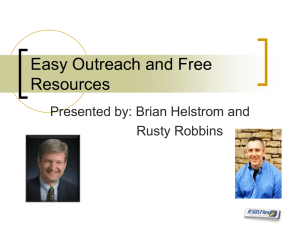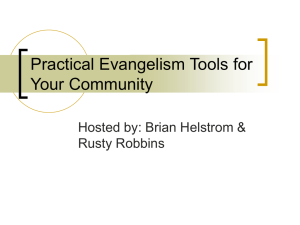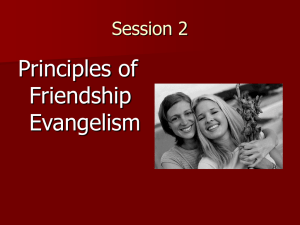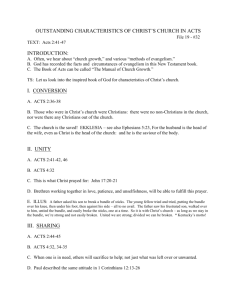How a Church Grows In Montana - the Rocky Mountain Christian
advertisement
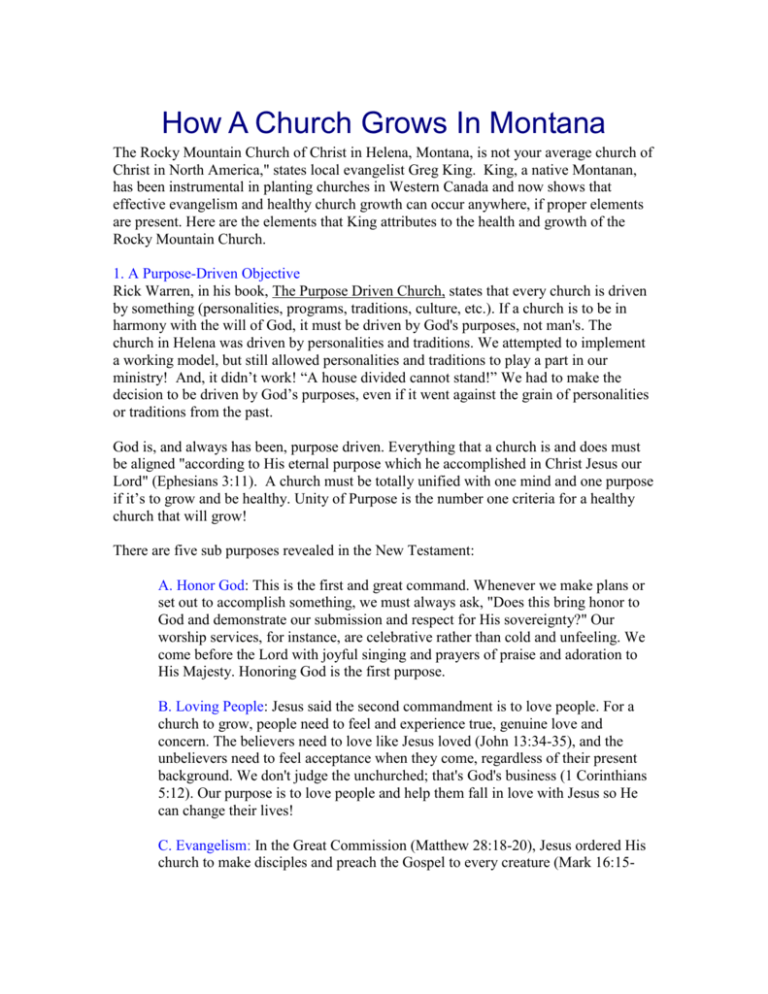
How A Church Grows In Montana The Rocky Mountain Church of Christ in Helena, Montana, is not your average church of Christ in North America," states local evangelist Greg King. King, a native Montanan, has been instrumental in planting churches in Western Canada and now shows that effective evangelism and healthy church growth can occur anywhere, if proper elements are present. Here are the elements that King attributes to the health and growth of the Rocky Mountain Church. 1. A Purpose-Driven Objective Rick Warren, in his book, The Purpose Driven Church, states that every church is driven by something (personalities, programs, traditions, culture, etc.). If a church is to be in harmony with the will of God, it must be driven by God's purposes, not man's. The church in Helena was driven by personalities and traditions. We attempted to implement a working model, but still allowed personalities and traditions to play a part in our ministry! And, it didn’t work! “A house divided cannot stand!” We had to make the decision to be driven by God’s purposes, even if it went against the grain of personalities or traditions from the past. God is, and always has been, purpose driven. Everything that a church is and does must be aligned "according to His eternal purpose which he accomplished in Christ Jesus our Lord" (Ephesians 3:11). A church must be totally unified with one mind and one purpose if it’s to grow and be healthy. Unity of Purpose is the number one criteria for a healthy church that will grow! There are five sub purposes revealed in the New Testament: A. Honor God: This is the first and great command. Whenever we make plans or set out to accomplish something, we must always ask, "Does this bring honor to God and demonstrate our submission and respect for His sovereignty?" Our worship services, for instance, are celebrative rather than cold and unfeeling. We come before the Lord with joyful singing and prayers of praise and adoration to His Majesty. Honoring God is the first purpose. B. Loving People: Jesus said the second commandment is to love people. For a church to grow, people need to feel and experience true, genuine love and concern. The believers need to love like Jesus loved (John 13:34-35), and the unbelievers need to feel acceptance when they come, regardless of their present background. We don't judge the unchurched; that's God's business (1 Corinthians 5:12). Our purpose is to love people and help them fall in love with Jesus so He can change their lives! C. Evangelism: In the Great Commission (Matthew 28:18-20), Jesus ordered His church to make disciples and preach the Gospel to every creature (Mark 16:15- 16). Evangelism has become a natural, daily part of the life of the members of our church, and they're trained how to do it effectively. D. Edification: Part of the Great Commission is "teaching people to obey." Once believers are won to Christ, the year-long process of growing them to Christ-like maturity begins. We have an entire curriculum we take every new member through their first year in the church. F. Equipping: Paul demonstrated that people needed to be trained and equipped in order to become productive in the ministry (Ephesians 4:11-16; 2 Timothy 2:2). These five purposes work in harmony at the Rocky Mountain Church, and everything we do must fit into these purposes-or we don't do them. From these five purposes, we've developed a "Purpose Statement": "The Rocky Mountain Church exists to bring people to Christ and membership in His body, grow them to Christ-like maturity, equip them for their personal ministry, help them discover and fulfill their life's mission, in order to magnify God." 2. Effective Evangelism "Evangelism," says King, "is not an event, but a process." It's the process of bringing a lost person into a saved relationship with Jesus Christ by the proclamation of the Gospel message. We've developed a series of eight lessons we call Building Your Relationship with God. The lessons are fill-in-the-blank type of lessons, and each takes about one hour to complete in a one-on-one study with an unsaved person. We even have the lessons on cassette tape so our members can use them along with the written lessons to lead people to Christ. Last year, we averaged conducting five studies with people every week, and baptized 28 people. Five studies per week in a church of 100-130 in attendance is not overwhelming, but it does keep you focused on the mission! In order to train our members in evangelism, we take everyone through the eight-lesson course and give a seven-page final exam. Every member from day one has gone through these lessons. They begin with Who is Jesus, Evidences of the Resurrection, The Word of God, The New Testament Church, Obeying the Gospel Call, The Kingdom of God, The Holy Spirit, and Miraculous Gifts of the Spirit. We also have another course that we teach called "Effective Evangelism" in which we teach more of the "how-to's" of doing personal evangelism. We’ve use a video presentation of someone conducting a one on one study to help train our soul winners. We help our members identify and handle the word effectively with a Calvinist, Catholic, atheist, agnostic, Hindu, Buddhist or Muslim. This removes the fear of doing evangelism and helps our members be effective in reaching their friends and neighbors for Christ. 3. Balanced Small Groups "I'm firmly convinced that a church cannot grow and remain healthy unless it has an infrastructure of well-organized and balanced small groups," King declares. We've studied the fastest growing churches in the U.S. and throughout the world and formulated our own flavor of balanced small groups.” King states that their groups closely model the successful formula used by Dale Galloway of the New Hope Community Church in Portland, OR. Galloway’s book, 20\20 Vision details their method. Each of our LIFE Groups has a well-trained leader who oversees that group and mobilizes it to fulfill the five purposes of God in harmony with our purpose statement as a congregation. Within each group, there is a group leader, an apprentice leader, a host or hostess, a child-care minister, a benevolent minister, a tele-care servant, and a prayer diary servant. As you can see, in a group of 10 people, you will have a 70 percent participation rate of the members. Everyone feels a part and can utilize his or her talents to minister in practical ways in the group. Each group has the mission of love, involvement, fellowship, and evangelism. Each group is organized with a minimum goal of winning one family to Christ every six months and helping them be integrated into the love and life of the body. We have eight groups, and at this rate, about 20 baptisms a year can be realized just through this avenue! Our groups are allowed to differ in their individual personality also. We have some groups that are membership groups -- to bring people to Christ with an evangelistic purpose. \\'e also have maturity groups designed to take new members through a curriculum to ground them in Bible doctrines and skills to help them grow to maturity in Christ. Some groups study the weekly sermon and apply it; others take a hook of the Bible and study it textually. Our tele-care servants make sure that every member is called weekly for encouragement and love. The benevolent servant organizes any need that may arise within each group so that primary care can be given instantly within each group, whether it be visiting the sick, organizing food for members who are in need, or gathering money for the power bill of a single mom. The group leaders attend a weekly meeting and are required to fill out an attendance sheet and list every member who was not in attendance that week. We ensure that every member is called for encouragement weekly and prayed for by name. In this way, we can account for every precious soul and make sure that no member ever slips out the back door unnoticed! 4. Practical Leadership and Ministry Training Our small group leaders are the primary ministers in the church. We have something like an "on-site" ministry training school in which we develop and train our leaders. In order to be a small group leader, a person must complete the following requirements: 1. Building Your Relationship with God Course (eight lessons) and seven-page final exam. 2. Effective Evangelism Course and final exam. 3. Small Group Leadership Course, and final exam. 4. 90-day apprenticeship in an existing group. We've learned that group leaders must be trained if they are to minister to people effectively. We don't want our group leaders to view themselves simply as someone who reads a Bible lesson in a home. We want them to be equipped to mentor, mobilize, evangelize, serve, train, lead, and counsel. Our leaders also receive encouragement and practical ministry training at the weekly meeting. Our sisters lead only women's ministries, but they go through the same training as everyone else. These are some of the elements that we've discovered for building healthy, balanced, effective churches to the glory of God. Downloadable curriculum on evangelism, small groups, leadership, and other topics developed and used at the Rocky Mountain Church is available at www.rockymountainchristian.org Or you can email Greg King at bigskyguy@juno.com Greg also conducts seminars internationally.
